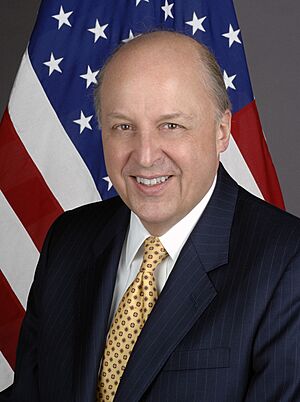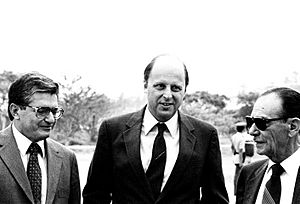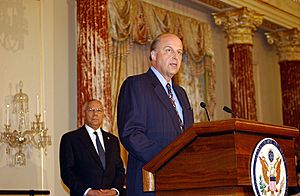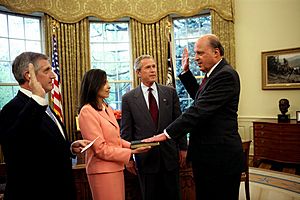John Negroponte facts for kids
Quick facts for kids
John Negroponte
|
|
|---|---|

Official portrait, 2007
|
|
| 15th United States Deputy Secretary of State | |
| In office February 27, 2007 – January 23, 2009 |
|
| President | George W. Bush Barack Obama |
| Preceded by | Robert Zoellick |
| Succeeded by | James Steinberg |
| 1st Director of National Intelligence | |
| In office April 21, 2005 – February 13, 2007 |
|
| President | George W. Bush |
| Preceded by | Position established |
| Succeeded by | Mike McConnell |
| United States Ambassador to Iraq | |
| In office July 29, 2004 – March 17, 2005 |
|
| President | George W. Bush |
| Preceded by | Krzysztof Biernacki (acting) |
| Succeeded by | Zalmay Khalilzad |
| 23rd United States Ambassador to the United Nations | |
| In office September 19, 2001 – June 23, 2004 |
|
| President | George W. Bush |
| Preceded by | Richard Holbrooke |
| Succeeded by | John Danforth |
| United States Ambassador to the Philippines | |
| In office October 26, 1993 – August 5, 1996 |
|
| President | Bill Clinton |
| Preceded by | Richard H. Solomon |
| Succeeded by | Thomas C. Hubbard |
| United States Ambassador to Mexico | |
| In office July 3, 1989 – September 5, 1993 |
|
| President | George H. W. Bush Bill Clinton |
| Preceded by | Charles J. Pilliod Jr. |
| Succeeded by | James R. Jones |
| 16th United States Deputy National Security Advisor | |
| In office November 23, 1987 – January 20, 1989 |
|
| President | Ronald Reagan |
| Preceded by | Colin Powell |
| Succeeded by | Robert Gates |
| 6th Assistant Secretary of State for Oceans and International Environmental and Scientific Affairs | |
| In office July 19, 1985 – November 23, 1987 |
|
| President | Ronald Reagan |
| Preceded by | James L. Malone |
| Succeeded by | Frederick M. Bernthal |
| United States Ambassador to Honduras | |
| In office November 11, 1981 – May 30, 1985 |
|
| President | Ronald Reagan |
| Preceded by | Jack R. Binns |
| Succeeded by | John Arthur Ferch |
| Personal details | |
| Born |
John Dimitri Negroponte
July 21, 1939 London, England |
| Political party | Republican |
| Spouse |
Diana Villiers
(m. 1971) |
| Children | 5 |
| Education | Yale University (BA) Harvard University |
John Dimitri Negroponte, born on July 21, 1939, is a well-known American diplomat. He has held many important roles in the United States government. He was the first ever Director of National Intelligence from 2005 to 2007. He also served as the United States Deputy Secretary of State from 2007 to 2009.
Mr. Negroponte worked for the United States Foreign Service for many years, from 1960 to 1997. During this time, he was a U.S. ambassador to several countries. These included Honduras, Mexico, and the Philippines. After leaving the Foreign Service, he continued to serve his country. He was the U.S. ambassador to the United Nations from 2001 to 2004. He also served as ambassador to Iraq from 2004 to 2005.
Contents
- Early Life and Education
- Career Highlights
- Ambassador to Honduras (1981–1985)
- Assistant Secretary for Environment, Oceans and Fisheries (1985–1989)
- Ambassador to Mexico (1989–1993)
- Ambassador to the UN (2001–2004)
- Ambassador to Iraq (2004–2005)
- Director of National Intelligence (2005–2007)
- U.S. Deputy Secretary of State (2007–2009)
- Later Career
- Personal Life
- Recognition and Awards
- See also
Early Life and Education
John Negroponte was born in London, England, on July 21, 1939. His parents, Dimitrios and Catherine, were from Greece. His father was a successful shipping businessman. He was also an alpine skier who competed in the 1936 Winter Olympics.
John Negroponte went to the Allen-Stevenson School and The Buckley School. He graduated from Phillips Exeter Academy in 1956. He then went on to Yale University, graduating in 1960. At Yale, he was part of the Fence Club. Other members included William H. T. Bush, who was the brother of President George H. W. Bush. Porter Goss, who later became Director of the Central Intelligence Agency, was also a member.
Career Highlights
John Negroponte began his career in the United States Foreign Service in 1960. He worked in many different places around the world. These included Asia, Europe, and Latin America. He also held important jobs at the State Department and the White House.
Early in his career, he disagreed with some decisions about the Vietnam peace talks. He believed that a peace agreement would not work without the approval of South Vietnam's leader. This showed his strong beliefs and independent thinking.
Later, he became a successful ambassador. From 1985 to 1987, he was an Assistant Secretary of State. He then served as Deputy Assistant to the President for National Security Affairs from 1987 to 1989. He was also the ambassador to Mexico (1989–1993) and the Philippines (1993–1996).
Ambassador to Honduras (1981–1985)
From 1981 to 1985, John Negroponte was the U.S. ambassador to Honduras. During this time, the U.S. provided more military aid to Honduras. The goal was to support efforts against the Sandinista government in Nicaragua.
Some people later raised concerns about human rights during this period. They questioned whether Ambassador Negroponte knew about abuses by the Honduran government. Documents released later showed that he was aware of these issues. He urged for reforms to address human rights concerns. He also pushed for updates to Honduras's laws and justice system.
The situation in Honduras was complex. The U.S. aimed to prevent the spread of communism in Central America. Ambassador Negroponte worked to find a middle ground. He wanted to support U.S. interests while also encouraging stability in Honduras.
Assistant Secretary for Environment, Oceans and Fisheries (1985–1989)
In this role, Negroponte helped negotiate the Montreal Protocol on Ozone. This was a very successful international agreement to protect the Earth's ozone layer. He also worked on scientific cooperation with the Soviet Union. This included treaties about dealing with nuclear accidents after the Chernobyl disaster.
Ambassador to Mexico (1989–1993)
As the U.S. Ambassador to Mexico, Negroponte played a key role in creating the North American Free Trade Agreement (NAFTA). This agreement helped to increase trade between the U.S., Mexico, and Canada. His work in Mexico was very important for modern American diplomacy.
Ambassador to the UN (2001–2004)
President George W. Bush appointed Negroponte as the U.S. ambassador to the United Nations in 2001. This happened shortly after the September 11, 2001 attacks. He helped the U.S. gain support for its policies at the UN. He also warned the Bush administration about potential problems with intervening in Iraq.
Ambassador to Iraq (2004–2005)
In 2004, President George W. Bush nominated Negroponte to be the United States Ambassador to Iraq. He took on this role after the transfer of power to the new Iraqi government. He advised the Bush administration that safety and security were most important before rebuilding Iraq. He also helped organize a peaceful election in the country.
Director of National Intelligence (2005–2007)
In 2005, President George W. Bush named John Negroponte as the first ever United States Director of National Intelligence (DNI). This was a very important job. His role was to coordinate all the different U.S. intelligence agencies. This included groups like the CIA and NSA.
As DNI, Negroponte worked to improve how intelligence agencies shared information. He also focused on making their electronic systems better. He appointed "mission managers" to focus on key threats and targets. These changes helped the intelligence community work more effectively.
Many people in the intelligence community and Congress praised his work. They said he greatly improved how agencies shared information about terror threats. In 2007, Negroponte resigned from this role to return to the State Department.
U.S. Deputy Secretary of State (2007–2009)
John Negroponte became the U.S. Deputy Secretary of State in February 2007. He served in this position until the end of the Bush administration in January 2009. This role is the second-highest position in the U.S. Department of State.
Later Career
After leaving government service, Negroponte joined McLarty Associates in 2009. This is a company that advises on international strategy. He also serves on the Leadership Council of Concordia. This group works to improve cooperation between public and private organizations.
In recent years, Negroponte has expressed his views on political matters. He was one of many former Republican national security officials who spoke out against Donald Trump in 2016 and 2020.
Personal Life
John Negroponte is skilled in languages. He speaks five: English, French, Greek, Spanish, and Vietnamese. He has several talented brothers. His elder brother, Nicholas Negroponte, founded the Massachusetts Institute of Technology's Media Lab. His brother Michel is an Emmy Award-winning filmmaker. His other brother, George Negroponte, is an artist.
John Negroponte is married to Diana Mary Villiers. They were married on December 14, 1971. They have five adopted children: Marina, Alexandra, John, George, and Sophia. All of their children were adopted from Honduras.
Recognition and Awards
John Negroponte has received many awards for his long and distinguished career. These include:
- National Security Medal
- State Department Secretary's Distinguished Service Award
- Lifetime Achievement Award from the World Affairs Councils of America
- Raymond "Jit" Trainor Award for Distinction in Diplomacy from Georgetown University (2005)
- Golden Plate Award from the American Academy of Achievement (2006)
- George F. Kennan Award for Distinguished Public Service (2011)
- Distinguished Service Award for the Advancement of Public Discourse on Foreign Policy (2014)
- Walter and Leonore Annenberg Award for Excellence in Diplomacy (2019)
See also
 In Spanish: John Negroponte para niños
In Spanish: John Negroponte para niños
- Negroponte doctrine
- Battalion 316, a Honduran army unit from the 1980s
- Iran–Contra affair
 | William M. Jackson |
 | Juan E. Gilbert |
 | Neil deGrasse Tyson |




